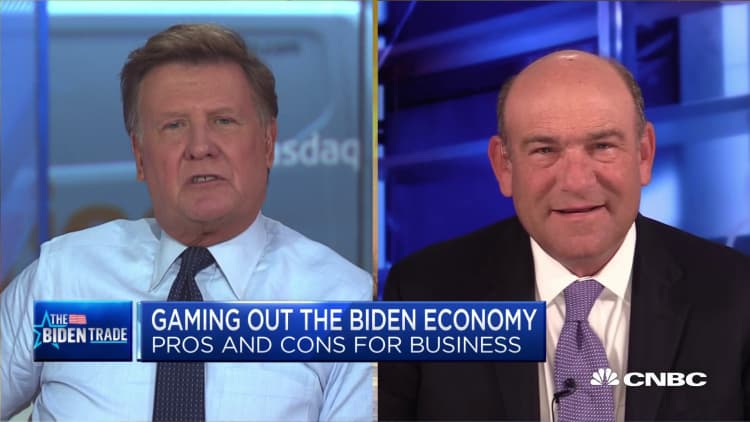President-elect Joe Biden's victory over incumbent President Donald Trump will establish "a sea change in attitude" about the future of the Affordable Care Act, said Karen Pollitz, a senior fellow at the Kaiser Family Foundation.
The landmark health-care law, more commonly known as Obamacare, has been under attack since Trump was elected to office in 2016, said Pollitz, who focuses on health reform and private insurance.
Trump spent the majority of his four years in the White House vowing to repeal former President Barack Obama's signature health-care law. While unsuccessful, he has been able to hobble it, including slashing its budget and allowing people to remain on short-term health plans, which as a rule offer less comprehensive coverage of benefits, for a year.

Obamacare is "unacceptable to me because it's too expensive and doesn't really do the job as well as we could have," Trump said during a speech in Charlotte, North Carolina, on Sept. 24. "It was terrible. That's the way I feel, too. It was terrible and very, very expensive. Hurt a lot of people."
During his campaign, Biden promised to not just preserve but build on Obamacare by expanding the number of people who are eligible for subsidies under the health-care law. The subsidies are currently available to families whose income is from 100% to 400% of the federal poverty level. For an individual, that means income from $12,490 to $49,960 in 2020, according to a report from the Kaiser Family Foundation published in September.
He has also proposed a new public option that would allow some Americans to choose a government-run health insurance plan similar to Medicare or Medicaid as an alternative to a private insurer. Additionally, Biden has said that he would pass legislation to protect patients from surprise bills and allow the federal government to negotiate drug prices, among other proposals.
"That's just a wholly different approach" than Trump, Pollitz said in a phone interview with CNBC, adding the U.S. will no longer have a sitting president who is actively trying to dismantle the current law. "Biden would really build on it."
To be sure, much of what Biden will do on health care and when he'll do it will depend on the Supreme Court and Congress, Pollitz added. The Supreme Court is set to hear the latest constitutional challenge to Obamacare — in California vs. Texas — on Tuesday. A coalition of GOP state attorneys general, joined by the Trump administration, is arguing that the health law is unconstitutional because Congress reduced the penalty on people who didn't have health insurance, the so-called individual mandate, to $0 in 2017. The mandate imposed a tax penalty on consumers who went uninsured and was a key part of the health-care law.
The death of Supreme Court Justice Ruth Bader Ginsburg earlier this year has created a new level of uncertainty over the health-care law. It's unclear how Trump's new Supreme Court pick, Justice Amy Coney Barrett, will side on the landmark case. Barrett repeatedly said during her confirmation hearings last month that she is not hostile to the Affordable Care Act.
A decision in the case, which could disrupt the health-care coverage of tens of millions of Americans, is expected by June of 2021.
"Nobody really knows how the Court will decide," Pollitz said. "Justice Barrett was very careful not to answer questions on this during her hearing."
Biden addressed the Supreme Court case during his final presidential debate with Trump last month. When asked by NBC News White House correspondent Kristen Welker what he would do if the Supreme Court rules Obamacare unconstitutional, Biden said he would turn the health law into "Bidencare."
"What I'm going to do is pass Obamacare with a public option, become Bidencare," he said on Oct. 22. "If you qualify for Medicaid and you do not have the wherewithal in your state to get Medicaid, you are automatically enrolled, providing competition to insurance companies."
Even if it appears the Supreme Court will side with the Republican-led states, there is some thought that a Biden presidency and a Democratic-controlled Congress could enact quick legislation to reinstitute the individual mandate penalty, Pollitz said, making the case moot. Raymond James analysts echoed this remark in a note to investors last month.
"If the individual mandate is deemed unconstitutional and Democrats do sweep in November (which we place as the most likely scenario at the time of writing this piece), they could immediately increase the individual mandate penalty to a higher dollar amount," Raymond James analyst Chris Meekins wrote in a note published Oct. 27.
"Additionally, if an opinion is not yet released, they could retroactively change the tax penalty when they enter office in January 2021," he added. "If they change the penalty amount, the Supreme Court could have to decide if they should even consider the case as the penalty would then meet the constitutional requirement of producing revenues for the federal government."
Brandon Couillard, an analyst at Jefferies, also said Biden needs the Senate to "make a significant change." That will likely be negative for health-care stocks, though, as it wouldn't keep the "status quo," he added.
"If Biden wins, Democrats need to take control of the Senate (while maintaining the House, which most expect) in order to have any chance of advancing a significant healthcare agenda," he said Sept. 22. "This scenario creates more volatility for healthcare stocks. If Biden wins, but has a split Congress, his healthcare plans are likely dead on arrival."
— CNBC's Tucker Higgins contributed to this report.


